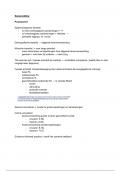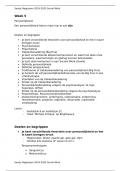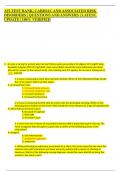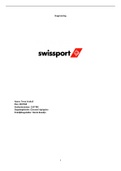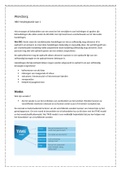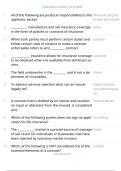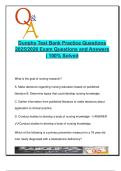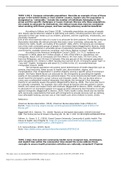Cursus gaat over kennis. Wat weten we over de wereld om ons heen? Wat zijn onze percepties? Hoe
begrijpen mensen de wereld? En wat is de rol van de media en informatie daarbij?
Twee vragen staan centraal:
1. Wat weten mensen van de wereld en hoe begrijpen ze hem?
En wat is de rol die de media daarbij spelen?
2. Hoe kunnen we mensen met behulp van media informeren op een manier die hen helpt te
functioneren in hun diverse maatschappelijke rollen?
Week 1 – Introductie: De Informatiesamenleving en de Kennismaatschappij
Doel: De maatschappelijke relevantie van onderzoek naar informatie en media vaststellen. Vragen
oproepen die centraal staan in de cursus. Waarde en functie van informatie/kennis/feiten exploreren.
Dobelli R (2010) – Avoid News: Towards a Healthy News Diet.
‘News is to the mind what sugar is to the body’
The time has come to recognize the detrimental effects that news has on individuals and
societies, and to take the necessary steps to shield yourself from its dangers. Our brains are
optimized for our original hunter-gatherer environment. Our brains now live in a world that is
the opposite of what we are designed to handle → Great risk and inappropriate, outright
dangerous behaviour.
News is easy to digest. Media feed us small bites of trivial matter, tidbits that do not really
concern our lives and do not require thinking. Almost no saturation. Beginning to recognize
how toxic news can be and learning to take first steps toward information diet.
1 – News misleads us systematically
News report do not represent the real world. Our brains have limited attention to spend on
more subtle pieces of intelligence that are small, abstract, ambivalent, complex, slow to
develop and quiet, much less silent.
New media outlets focus on the highly visible. News grabs out attention. Highly visible
misleads us! As a result of news, we walk around with the completely wrong risk map in our
heads. We are not rational enough to be exposed to the news-mongering press. Dangerous
thing, because the probabilistic mapping we get from consuming news is entirely different
from the actual risks that we face.
Solution: cut yourself off from news consumption entirely.
2 – News is irrelevant
The consumption of news is irrelevant to the forces that really matter in your life. At its best, it
is entertaining, but still irrelevant. People find it very difficult to recognize what is relevant.
Much easier to recognize what is new. Relevance does not come naturally. News does.
Relevance is a personal choice. Do not take the media’s view for it.
Media organizations want you to believe that news offers individuals some sort of a
competitive advantage. Many people fall for that. News consumption is a competitive
disadvantage. The less news you consume the bigger the advantage you have.
3 – News limits understanding
News has no explanatory power. News items are little bubbles popping on the surface of a
deeper world. News organizations pride themselves on correctly reporting the facts, but the
facts that they prize are just epiphenomena of deeper causes. It is not “news facts” that are
important, but the threads that connect them. What we really want is to understand the
underlying processes, how things happen.
,The important stories are non-stories: slow, powerful movements that develop below the
journalists’ radar but have a transforming effect. The more “news factoids” you digest, the
less of the big picture you will understand.
Reading news to understand the world is worse than not reading anything. Best: cut yourself
off from daily news consumption entirely.
4 – News is toxic to your body
News constantly triggers the limbic system. Panicky stories spur the release of cascades of
glucocorticoid (cortisol). News consumers risk impairing their physical health. Potential side
effects of news: fear, aggression, tunnel-vision and desentization.
5 – News massively increases cognitive errors
Confirmation bias! We automatically, systematically filter out evidence that contradicts our
preconceptions in favour of evidence that confirms our beliefs. “What the human being is
best at doing is interpreting all new information so that their prior conclusions remain intact” –
Buffett.
Story bias! Our brains crave stories that “make sense” – even if they do not correspond to
reality. News organizations are happy to deliver those fake stories.
6 – News inhibits thinking
Thinking requires concentration. Concentration requires uninterrupted time. News makes us
shallow thinkers. News severely affects memory.
Two types of memory: Long-range memory (capacity nearly infinite) and working memory
(limited capacity to minimum amount of slippery data). Path from short-term to long-term
memory is choke-point in the brain, but anything you want to understand must past through
it. News is an interruption system. Seizes your attention only to scramble it. News distraction
is the biggest barricade to clear thinking.
7 – News changes the structure of your brain
News works like a drug. Once you get into the habit of checking news, you are driven to
check it even more often. “Long-term potentiation” (LTP) process – attention is set on fast-
breaking events, so you hunger for more data about them.
The more news we consume, the more we exercise the neural circuits devoted to skimming
and multitasking while ignoring those used for reading deeply and thinking with profound
focus.
Deep reading is indistinguishable from deep thinking. The way you think changes.
8 – News is costly
News wastes time. Exacts exorbitant costs. News taxes productivity three ways: (1) count
the consumption-time that news demands, (2) tally up the refocusing time – or switching
cost, and (3) news distracts us even hours after we have digested today’s hot items.
Information is no longer a scarce commodity, but attention is. Why give away your mind?
9 – News sunders the relationship between reputation and achievement
Reputation affects how people cooperate in society. The concept of “fame” entered society.
Fame is misleading because generally people become famous for reasons that have little
relevance to our lives. News sunders the relationship between reputation and achievement.
10 – News is produced by journalists
Journalism has some incompetent, unfair practitioners who do not have the time – or the
capacity – for deep analysis.
,11 – Reported facts are sometimes wrong, forecasts always
Sometimes, reported facts are simply mistaken. With reduced budgets, fact checking may be
an endangered step in the process. Many news stories include predictions, but accurately
predicting anything in a complex world is impossible. Forecasts by journalists and experts
are almost always completely wrong. Incorrect forecasts are not only useless, they are
harmful.
12 – News is manipulative
Stories are selected or slanted to please advertisers (advertising bias) or the owners of the
media (corporate bias), and each media outlet has a tendency to report what everyone else
is reporting, and to avoid stories that will offend anyone (mainstream bias).
Journalism shapes a common picture of the world and a common set of narratives for
discussing it – sets the public agenda.
13 – News makes us passive
News stories are overwhelmingly about things you cannot influence. Fatalistic outlook on the
world. If the human brain encounters a barrage of ambiguous information without being able
to act upon that information, it can react with passivity and a sense of victimhood → Learned
Helplessness.
14 – News gives us the illusion of caring
News wraps us in a warm global feeling. We are all world citizens. We are all connected. The
planet is one global village. The fact is, consuming news does not make us more connected
to each other. We are connected because we interact and trade.
15 – News kills creativity
Things we already know limit our creativity. The creativity-killing effect of news might also be
due to something simpler: distraction. If you want to come up with old solutions, read news. If
you are looking for new solutions, do not read news.
→ Go without news. Cut it completely. Go cold turkey.
Make news as inaccessible as possible. Read magazines and books which explain the
world. First week will be the hardest.
Society needs journalism – but in a different way. Investigative journalism is relevant in any
society. Need more hard-core journalists digging into meaningful stories. Need reporting that
polices society and uncovers the truth.
Bhatti Y (2010) – What Would Happen If We Were Better Informed? Simulating Increased
Knowledge in European Parliament (EP) Elections.
What would happen if the public in a multiparty system became better or worse informed? Moderate
increase in political knowledge results in more than 3 percentage point higher turnout. Relative support
for parties would also be affected, less than for turnout. Social democratic parties would be the big
losers and among the winners would in particular be conservative parties. Party level changes appear
larger than in two-party systems, predicted changes in relative power between political blocs are at
best moderate.
Three Nordic EU Members – Denmark, Sweden, and Finland. Ep in 2004 elections. Used the
counterfactual simulation method.
Examining information effects in EP elections is particularly interesting for at least three
reasons:
, 1. Although the EP has gained increasing important over the years, there’s still very little
knowledge about voting behaviour in general and role of information in particular in
these elections.
2. EP elections are particularly interesting, since they are second-order elections in
which public engagement is substantially lower than in first-order elections.
3. Information effects on electoral behaviour has mainly been examined in the American
two-party system.
Political knowledge has been of central interest of political scientists for decades. Informed
public is commonly regarded as a necessary condition for a well-functioning representative
democracy. Problem is that the world does not seem to live up to our normative ideals.
1. Individual opinion may not be uniformed after all even though most individuals hold limited
factual political knowledge.
2. Collective choice may be informed, though individual opinion is not, due to ‘miracle of
aggregation’. Individual errors cancel out when collective decisions are taken.
Simulation of the effect of
knowledge on EP turnout – two
simulations (1) Bartels and Althaus
who calculate impact of a fully
informed public (2) knowledge
level is changed gradually and
relative distances in knowledge
levels are kept constant.
Simulation of the effect of knowledge on EP vote decisions –
(1) excluding turnout effect (2) including turnout

